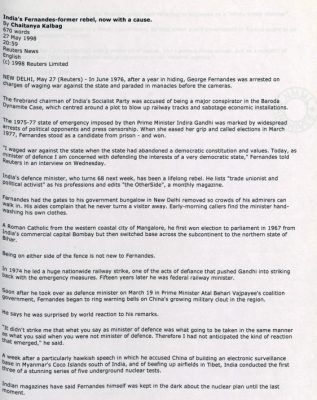India’s Fernandes- former rebel, now with a cause
[Reuters]
Published date: 27th May 1998
27 May 1998
Reuters News
English
(c) 1998 Reuters Limited
NEW DELHI, May 27 (Reuters) – In June 1976, after a year in hiding, George Fernandes was arrested on Charges of waging war against the state and paraded in manacles before the cameras.
The firebrand chairman of India’s Socialist Party was accused of being a major conspirator in the Baroda Dynamite Case, which centred around a plot to blow up railway tracks and sabotage economic installations.
The 1975-77 state of emergency imposed by then Prime Minister Indira Gandhi was marked by widespread arrests of political opponents and press censorship. When she eased her grip and called elections in March 1977, Fernandes stood as a candidate from prison – and won.
I waged war against the state when the state had abandoned a democratic constitution and values. Today, as minister of defence I am concerned with defending the interests of a very democratic state,” Fernandes told Reuters in an interview on Wednesday.
india’s defence minister, who turns 68 next week, has been a lifelong rebel. He lists “trade unionist and political activist” as his professions and edits “the Other Side”, a monthly magazine.
Fernandes had the gates to his government bungalow in New Delhi removed so crowds of his admirers can walk in. His aides complain that he never turns a visitor away. Early-morning callers find the minister hand-washing his own clothes.
A Roman Catholic from the western coastal city of Mangalore, he first won election to parliament in 1967 from India’s commercial capital Bombay but then switched base across the subcontinent to the northern state of Bihar.
Being on either side of the fence is not new to Fernandes.
In 1974 he led a huge nationwide railway strike, one of the acts of defiance that pushed Gandhi into striking back with the emergency measures. Fifteen years later he was federal railway minister.
Soon after he took over as defence minister on March 19 in Prime Minister Atal Behari Vajpayee’s coalition government, Fernandes began to ring warning bells on China’s growing military clout in the region.
He says he was surprised by world reaction to his remarks.
It didn’t strike me that what you say as minister of defence was what going to be taken in the same manner Is what you said when you were not minister of defence. Therefore I had not anticipated the kind of reaction that emerged,” he said.
A week after a particularly hawkish speech in which he accused China of building an electronic surveillance base in Myanmar’s Coco Islands south of India, and of beefing up airfields in Tibet, India conducted the first three of a stunning series of five underground nuclear tests.
Indian magazines have said Fernandes himself was kept in the dark about the nuclear plan until the last moment.
I was speaking in terms of our security perceptions, and that it configured in a way that people thought that I was acting as a curtain-raiser for (the tests) is very unfortunate,” Fernandes told Reuters.
Fernandes said he had been misquoted as saying China was India’s “enemy number one” and added: “I was asked in a television interview if China is enemy number one and I said in our overall threat perception, China Is potential threat number one.”
Fernandes’s Samata Party is a key partner In the federal coalition government. How did he find being a socialist in an alliance dominated by Vajpayee’s Hindu nationalist Bharatiya Janata Party?
Fernandes said he was upset that the Western press kept referring to Vajpayee as a “Hindu prime minister”.
“I don’t know how the coalition is a Hindu government. By that token every government in Europe ought to be a Christian government,” he said.
“Being a socialist I am concerned with a whole lot of issues, and I pursue those issues. But as a minister of this government I pursue the policies and programmes in our national agenda.”






